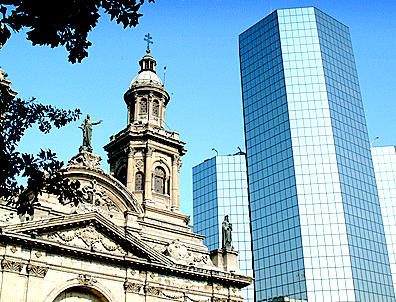
In a time when many are calling for the end of capitalism, entrepreneurship and the free market in Latin America, Chile is marching to the beat of a different drummer. And its tune is likely to deliver continued economic growth.
The recently released 2010 Index of Economic Freedom from The Heritage Foundation and The Wall Street Journal finds that Chile is among the most economically free countries on the planet. But what can economic freedom do for a country?
And more importantly, can other Latin American countries emulate the Chilean model?
Now in its 16th year of publication, the Index of Economic Freedom measures the economic freedom of some 180 countries. They're graded based on: government size, regulatory environment, labor policies and judicial system, among other factors.
Economic freedom, put simply, is the ability of individuals to control their own labor and property. In an economically free society, individuals are free to work, produce and consume without having to worry about an onerous and constraining government.
According to the Index authors, economic freedom is the key to unlocking the full potential of the state and its people. Moreover, economic freedom leads to a better quality of life and higher standard of living.
As proof, economies rated "free" or "mostly free" enjoy incomes more than three times the average levels in all other countries and more than 10 times higher than the incomes of "repressed countries." Additionally, prosperous countries generally have higher literacy rates, as citizens have increased access to educational opportunities and medical attention.
The key to understanding the relationship between economic freedom and prosperity is particularly important in Latin America, where a battle of ideas is underway. In several nations, totalitarian regimes have replaced democracies. "21st century Socialism" has replaced the free market. Freedom of speech and a free press are deemed obsolete and seen as hampering progress.
Unfortunately for the people falling under the spell of charismatic autocrats, the only thing different with this new breed of socialism is its name. Socialist policies, as they always have in practice, are failing to reduce unemployment and deliver better lives for people. Those in control of the nation's purse strings are often the ones living comfortably, while the masses continue to cling to the elusive hope that socialism will grow the economy.
However, Chile has charted a different path than many of its neighbors. As a result, it's ranked 10th overall in the Index and tops all other Latin American countries. Chile's healthy economic freedom comes partly from its openness to global trade and investment. Additionally, Chile benefits from a transparent and stable financial and judicial sector, where there's little tolerance for corruption.
This environment has attracted foreign investment, leading to steady economic growth in various sectors. Further, Chile was recently invited to join the elite "Organization for Economic Cooperation and Development."
As the people of Latin America contemplate their futures, they should question the socialist rhetoric espoused by those who claim anti-free market policies will bring economic equality. History reminds us of previous failed experiments all over the world, including Latin America, where people gladly turned over their freedoms only to face continued disappointments.
Latin Americans must resist the allure of socialism. Try as it might, the public sector cannot match the vitality of the private sector in promoting growth.
Israel Ortega is a Senior Media Services Associate at The Heritage Foundation. The complete findings of the 2010 Index of Economic Freedom can be found here: http://www.heritage.org/index/
